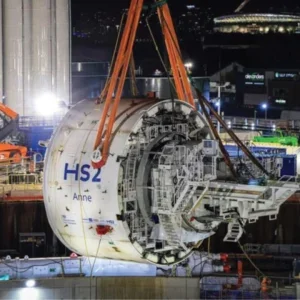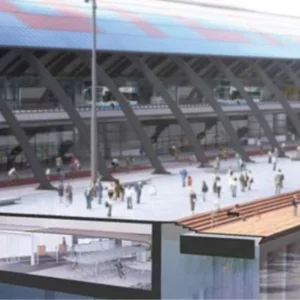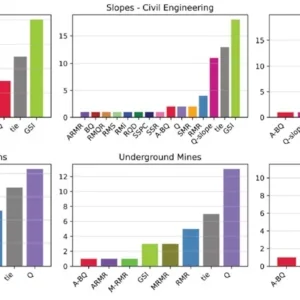BELINDA LI grew up in Windsor, Ontario, and as a child she understood many people in the world lived in diffficult circumstances. This awareness stemmed, in part, from her parents’ experience growing up in China, and from her mom coming to Canada as refugee from Vietnam — where she lived without access to water and electricity. "I was curious about how people are working to improve that," Li says.
She completed a joint Bachelor of Applied Science in Environmental Engineering between the University of British Columbia (UBC) and University of Northern British Columbia, and then a Master of Applied Science in Geoenvironmental Engineering at UBC. While completing her masters degree she started volunteering with EWB’s UBC chapter. After graduation she started working for Tetra Tech EBA in Vancouver as a junior environmental engineer, part of the solid waste management team.
"I still felt that push of, I need to just go and apply for a program," Li says, "because now I’m so curious about international development; I’m not too far into my career; it’s a good time for me to go."
She was accepted and prepared to move to Malawi where she worked from September 2012 to May 2014 as an operations and maintenance specialist. She says her colleagues at Tetra Tech, while sad to see her go, were supportive and understanding, and ready to live vicariously through her experience.
MANGOCHI
Li explains that EWB Canada had previously focused more on providing technical assistance to projects, but that has shifted. Working in partner countries EWB Canada saw that a lot of the challenges are more personnel-related. "The niche that wasn’t filled was a lot of management-related issues. It’s still very much similar to what an engineering manager might do here."
There are many organizations focusing on technology, in a community — getting water supply, she says as an example — but there aren’t as many organizations that work on liaising with government or larger players in the sector. For EWB Canada part of the goal was to provide a bigger reach and create a longer lasting change. She compares her role to that of a management consultant.
For the first year EWB Canada placed Li in Mangochi, a rural district (the equivalent of a county) with a population of about 1 million. Here she worked on two components: one was an immersion learning period, to see how a district water office works.
"When you have any long-term volunteers they would have an initial learning period to become accustomed to the work environment. I followed different field staff doing job shadowing and talked to a lot of the different government staff to figure out what their challenges are and how they see their role."
The Icelandic International Development Agency (ICEIDA), one of the funding agencies to the district for water infrastructure, sponsored Li’s placement. This immersion period also allowed her to evaluate how well the program was working for ICEIDA, which funds the district directly but allows the district to implement the program.
"They have a relatively more handsoff approach because they want the government and the people who are there locally to take the lead on development," which is approach supported by EWB Canada, she explains. The other component of her work was to uncover challenges within the district office and then to work with staff to implement solutions. "We were almost using the district as a living lab where we’d have a challenge and we’d work together to find a way to address it, and then try it out and see what happens," she says.
The goal here was part of EWB Canada’s mission in Malawi: generating different, small-scale and small resource solutions for improving the management of the district water offices. "Generally these districts are very under-resourced," she says. "They’ve got thousands of water points they need to take care of but they only have a handful of staff. Some districts, on monthly basis, would only get CAD 100-200 of government funding a month."
She continues, "they don’t have a enough fuel or the means to travel out to all these rural communities to check their boreholes. So what we were working on was ways that they can do that without using a lot of resources."
The district office focused on improving their field source, how they collect data, implementing forms for going out to meeting minutes, for example.
"A lot of it is pretty basic management ideas," Li says, as well as improving computer skills. "The simplest solution that you can find that someone from the district actually identified and decided they wanted to do — we were there as a buffer to help them along the way and add any technical support." There were some challenges when taking on her new role in Malawi, Li notes. For example, because her colleagues knew she was there on behalf of ICEDA to collect information, they worried she was a spy or that their spending was under scrutiny. "There was a bit of trust-building to say, ‘No, I’m actually on your side. I’m trying to help figure out what is working, what’s not working, so that the ways they give you support from ICEDA would be better.’
"I think that improved a lot more after we did a big workshop session with all the field staff to get them to come up with ideas of how the program can be better. We had the people from ICEDA attend the workshop, and had the field staff directly present to them. It just showed: ‘my role really is trying to help you, not just to look at what you’re doing and report it behind your back.’" Blantyre
In the last eight months of her placement Li moved to Blantyre, a city in the south. Water AID provided funding to develop a document compiling and highlighting all different solutions districts had implemented for increasing safe drinking water in their communities. Li was the editor of this best practices handbook, coordinating with other EWB partners in different districts.
"I got case studies from all the districts and partners, and also got a pretty broad range, from the different districts, of what their challenges are. We could frame the handbook in a way that would work best for them."
Her work ran the gamut of helping organize workshops to facilitate discussion about the content of the handbook to its actual production: the layout, design and graphics, as well as the writing, and the copy editing, she says.
"A lot of people had different ideas of what they thought should be in there. I had to somehow compile all of these into one cohesive document that most people were happy with it," she explains. "But it was really fun and very much reflects on the type of work that I’m doing right now. We’re a consultant and most of our clients are in the public sector. A lot of times what we work on is very political, or we have to go through a city council to get approved. So we’re often in the middle of those types of battlegrounds where everyone has their opinions and we have to be that mutual consultant that provides evidence and the recommendation."
Team-Building
A lot of the work hadn’t been implemented long enough for Li to see the full effect while she was in Mawali. She says, looking at the big picture, a lot of the notable success in her experience with EWB revolved around facilitating valuable connections that might not otherwise have been organized. "When we did have that workshop [in Mangochi] and were able to gather all that information from people and really get a pretty comprehensive look of what everyone was thinking and feeling. That was really valuable for ICEDA. We realized that the field staff doesn’t have a very good, direct report back to the funders.
"This is actually a common model that you see with a lot of large donors — it’s almost like the larger the donor the more it’s an issue. ICEDA is a small donor so it’s relatively flexible. Their country directors have the time to go and meet the field staff." This isn’t the case with all organizations, she reiterates.
"Creating that opportunity and making that happen and making that link between someone who is very high up and the field staff, it was really very interesting to see."
Similarly, when she was developing the handbook in Blantyre and hosted workshops, those brought together people from the government, NGOs, donors and field staff, to talk about issues that actually affect everyone involved. "We had people from all layers of the sector. These people generally don’t get the opportunity to meet."
The feedback was very positive, she says. "That was really cool and it was really neat that we were able to see that and facilitate that process."
Every day in Malawi was different, and could comprise meetings at the office or going out in the field on the back of a motorbike. "A lot of my time was spent just talking to different people, which was really great," she says. "It was really cool to learn and interact with a large number of staff who are from different parts of this really big, complex system."
Living in Malawi required a big adjustment, especially, she says adapting to the culture. A lot of the different cultural norms that she wasn’t accustom to could be attributed to gender roles. Li knew that women weren’t usually taking on roles within a district office. "I was really the only female there besides the administrative assistant," she explains. "There aren’t many female engineers."
Her district was something of an exception due to ICEDA’s funding, which had gender equality as one of its priorities. They were actively recruiting more female field staff.
"If you go to any other district it’s generally almost all male."
But it was presented in other ways. She lived with a host family, and observed the different gender roles in a household. Compared to Canada, domestic violence is more prevalent, and it was also challenging for her to see the lack of higher quality health care compared to what is available in Canada. "Within that one year that I was there, two staff members died, and suddenly," she says.
Despite the challenges of adjusting to life in a different culture, Li’s passion for development work and the accomplishments of working with the district water offices during her EWB experience are evident. She’s presented at the BC Chapter’s TAC Talks last autumn, and encourages people who are looking to advance their careers and gain new skills in different environments, to consider doing an EWB placement.
"When you get thrown into an environment that’s completely different from your own you just end up having to learn a lot, challenge yourself and to see things in a different way. You just become a different person going through this type of experience," she says, noting there are ways she approaches her work at Tetra Tech that she can attribute to her experience and personal growth working in Malawi






